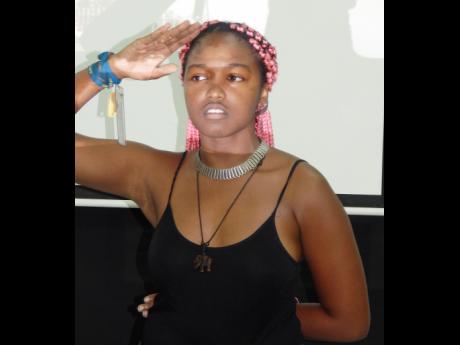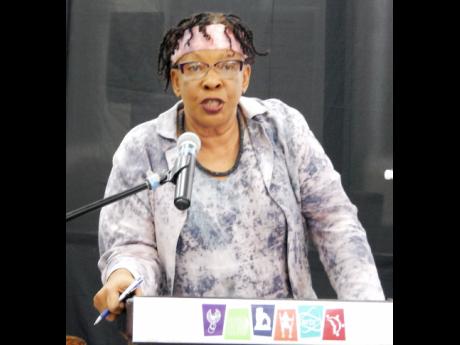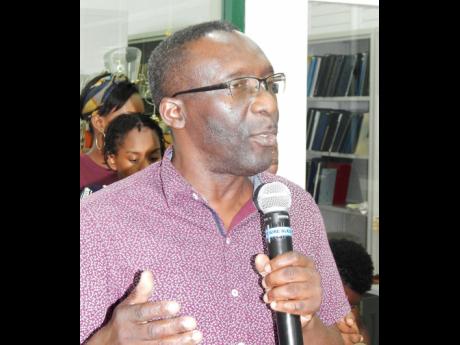For the Reckord | Dynamics of dub poetry
Last Thursday, an enthusiastic discussion of the dynamics of dub poetry with the island's leading authority on the genre, Professor Mervyn Morris, took place at the Edna Manley College of the Visual and Performing Arts (EMCVPA).
Held in the college's library, the session was titled 'From McKay to Mikey: Gimme Likkle Dub Music Right Yahso Tonight'. It was billed as "a celebration of the contribution of EMCVPA to the development of dub poetry". The latter part of the title is a quotation from a poem by the late Mikey Smith - a former School of Drama student in the mid-1970s who began writing poetry while a student and went on to become one of Jamaica's most famous dub poets.
Morris told the audience that Oku Onuora, another School of Drama student (for a year), insists that he first used the phrase "dub poetry" - to describe his own poetry and eventually, the genre. However, Morris explains that years before, another Jamaican poet - the UK, based Linton Kewsi Johnson - wrote about the "dub lyricism" of musicians like Big Youth, I-Roy, U-Roy and Dillinger.
According to Morris, Onuora admitted to being "aware" of those deejays but said that his writing was most influenced by the reggae musicians Bob Marley, Peter Tosh and Burning Spear. "For me, Bob is one of the greatest poets," Onuora had said.
Onuora, in a summary description of dub poetry, said it meant "dubbing out 'isms' and 'schims' and dubbing consciousness into people's heads".
Morris gave a more comprehensive one: "Dub poetry, which is written to be performed, usually incorporates a music beat - often a reggae beat. Often, but not always, the performance is done to the accompaniment of music, recorded or live. Dub poetry is often also available on radio, in television, in audio recording, and on film. Many dub poets also publish books. Dub poetry is usually, but not always, written in Jamaican language, which can be anything between what we use to call the dialect, or Patois, or Jamaican Creole, and what is recognisably standard English with a Jamaican accent. By extension, dub poetry may be written in the informal language of people from anywhere."
Morris said that while McKay was "a significant ancestor of the dub poet", few dub poets acknowledge his pioneering work. His first two books - which were published in 1912, the very year he left Jamaica never to return - used Patois.
On the other hand, cultural icon Louise Bennett is often cited by the poets as a strong influence. She is "the mother of it all", said Smith. Onuora wrote in one book, 'Miss Lou a de moddah fi patwa.' Johnson said in an interview: "There wouldn't be a Linton Johnson without a Louise Bennett," and Mutabaruka put it poetically "Miss Lou, Miss Lou, yu heavy fi true."
PROTESTING INJUSTICE
What those poets thank Bennett for, said Morris, is demonstrating that the Jamaican language is a legitimate one for literary art - not for the style or the content of her poems. While many of her poems protest injustice, her mode is usually ironic and "not obviously angry".
However, most dub poets "often foreground their political positions", Morris said. They want their anger to be immediately recognisable. "Active response to oppression is a recurring theme in dub poetry," he stated.
Morris also pointed out. "Some prominent dub poets don't wish to be called by that name. They might want to write some poems they don't want to perform. They want the freedom to explore a range of human concerns."
He quoted Johnson as declaring, "I've always seen myself as a poet. Full stop," Mutabaruka as insisting, "My poetry is just poetry," and Jean 'Binta' Breeze as explaining, "I'd rather say I'm a poet and write some dub poems than say I'm a dub poet."
Morris argued that since some dub poets offer printed versions of their work, they should pay attention to what's published - like being consistent in their spelling. He spoke about assisting Smith to prepare his book It A Come - a book that was well received in Britain. It was, in fact, a Poetry Society recommendation.
Morris ended his talk with an appeal to poets to exercise care in their writing, pointing out that " ... because they have taken care, some dub poets are more rewarding than others".
The function was one of the regular (He) Art of the Matter events organised by the college orator, Dr Amina Blackwood-Meeks.




